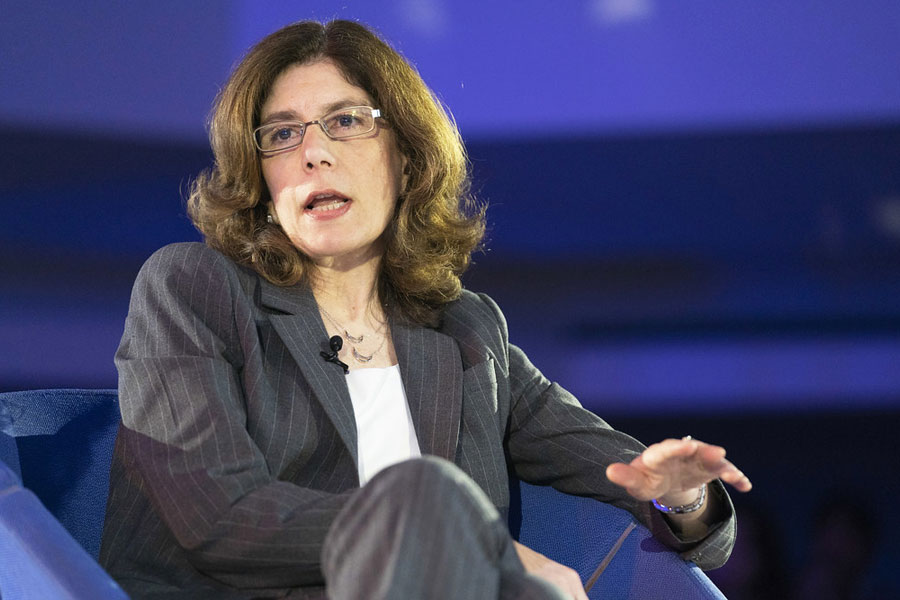
Fortune News | Jul 06,2019
Dec 2 , 2023
By Bjorn Lomborg
The spectacle of another annual climate conference is getting underway in Dubai. Like Kabuki theatre, performative set pieces lead from one to the other: politicians and celebrities arrive by private jets; speakers predict imminent doom; hectoring NGOs cast blame; political negotiations become fraught and inevitably go over time; and finally, the signing of a new agreement that participants hope and pretend will make a difference.
This circus has been repeated since the 1990s.
Despite 27 previous conferences with iterations of ominous speeches and bold promises, global emissions have inexorably increased, punctuated just once by the economic shutdown of COVID-19. This year is likely to see higher emissions than ever before.
Almost every rich country preaches far more than it delivers. This is exemplified by the European Union (EU), which has promised more than anyone else, yet — when forced by Russia's invasion of Ukraine to cut off gas imports — went looking in Africa for more oil, gas and coal. Almost every poor country understandably prioritises prosperity - abundant, cheap and reliable energy — which still means fossil fuels.
Underpinning the climate summit farce is one big lie repeated repeatedly: that green energy is on the precipice of replacing fossil fuels in every aspect of our lives. This exaggeration is championed by the International Energy Agency (IEA), which has turned from an impartial arbiter of energy data to the proponent of the far-fetched prediction that fossil fuels will peak within just seven years.
The claim ignores that any transition from fossil fuels occurs only with enormous taxpayer-funded subsidies. And while major energy players like Exxon and Chevron are moving back to investment in fossil fuel, big bets on green energy have failed spectacularly. Over the past 15 years, alternative energy stocks have plummeted in value, thus sending the pensions of ordinary workers tumbling due to virtue signalling pension companies, while general stocks have increased more than four-fold.
What will not be acknowledged in the United Arab Emirates (UAE) — because it has never been accepted at a global climate summit — is the awkward reality that while climate change has actual costs, climate policy does, too. In most public conversations, climate change costs are vastly exaggerated. Consider how every heat wave is depicted as an end-of-the-world, cataclysmic killer while the far greater reductions in deaths from warmer winters pass without being remarked on. Yet the costs of climate policy are bizarrely ignored.
Analysing the balance between climate and policy costs has been at the heart of the study of climate change economics for more than three decades. Renowned economist William Nordhaus is the only climate change economist recognised with a Nobel Prize. His research shows that we should do something about climate change: early cuts in fossil fuel emissions are cheap and will reduce the most dangerous temperature rises.
But his work also shows that highly ambitious carbon reductions will be a bad deal, with phenomenally high costs and low additional benefits.
Climate activists, who insist we should listen to the science, have consistently ignored this research and encouraged wealthy world leaders to make ever-greater climate promises. Many leaders have even gone so far as to promise net-zero carbon emissions by 2050. Despite this likely being the single costliest policy ever pledged by world leaders, it was made without a single peer-reviewed estimate of the full costs. Earlier this year, a special "Climate Change Economics" issue made the first such analyses.
This astonishing work has gone almost entirely unreported by any major news outlet. It shows that even with remarkably generous assumptions, the benefits of pursuing net zero will slowly inch upward over the century. By mid-century, the benefits — the avoided costs from climate change — could reach about one trillion dollars each year.
But the costs would be much, much higher.
Three different modelled approaches show far higher costs than benefits for every year throughout the 21st Century and far into the next. By 2050, the annual costs of the policy range between 10 trillion and 43 trillion dollars. That's four to 18pc of the global GDP. Consider that the total tax intake of all governments worldwide today is about 15pc of global GDP — and politicians would potentially have us spend more than that.
Across the century, the benefit is 1.4pc of global GDP, while the cost averages at 8.6pc of global GDP. Every dollar in cost delivers perhaps 16 cents of climate benefits. Clearly, this is an atrocious use of money. The only thing that could prevent this summit from being a retread of 27 other failures is if politicians acknowledge the actual cost of net zero policy — and instead of making more carbon cut promises, vow to increase research and development (R&D) in green energy dramatically.
This would help innovate the price of low-carbon energy below that of fossil fuels to persuade every country in the world to want to make the switch. Instead of subsidising today's still-inefficient technology and trying to brute force a transition by pushing up the price of fossil fuels, we need to make green technologies genuinely cheaper.
Sadly, that seems a far-fetched hope. Instead, this climate summit looks set to be another wasted opportunity producing yet more hot air.
PUBLISHED ON
Dec 02,2023 [ VOL
24 , NO
1231]


Fortune News | Jul 06,2019

Commentaries | Oct 02,2021

Commentaries | May 03,2025

Viewpoints | Dec 02,2023

Viewpoints | Mar 09,2024

Exclusive Interviews | Jan 24,2023

Sunday with Eden | Dec 17,2022

Commentaries | Aug 10,2019

Viewpoints | Nov 16,2024

My Opinion | Nov 27,2018

My Opinion | 132105 Views | Aug 14,2021

My Opinion | 128507 Views | Aug 21,2021

My Opinion | 126435 Views | Sep 10,2021

My Opinion | 124046 Views | Aug 07,2021





Dec 22 , 2024 . By TIZITA SHEWAFERAW
Charged with transforming colossal state-owned enterprises into modern and competitiv...

Aug 18 , 2024 . By AKSAH ITALO
Although predictable Yonas Zerihun's job in the ride-hailing service is not immune to...

Jul 28 , 2024 . By TIZITA SHEWAFERAW
Unhabitual, perhaps too many, Samuel Gebreyohannes, 38, used to occasionally enjoy a couple of beers at breakfast. However, he recently swit...

Jul 13 , 2024 . By AKSAH ITALO
Investors who rely on tractors, trucks, and field vehicles for commuting, transporting commodities, and f...

Jul 12 , 2025
Political leaders and their policy advisors often promise great leaps forward, yet th...

Jul 5 , 2025
Six years ago, Ethiopia was the darling of international liberal commentators. A year...

Jun 28 , 2025
Meseret Damtie, the assertive auditor general, has never been shy about naming names...

Jun 21 , 2025
A well-worn adage says, “Budget is not destiny, but it is direction.” Examining t...

Jul 13 , 2025 . By YITBAREK GETACHEW
The Addis Abeba City Revenue Bureau has introduced a new directive set to reshape how...

Jul 13 , 2025 . By BEZAWIT HULUAGER
Addis Abeba has approved a record 350 billion Br budget for the 2025/26 fiscal year,...

Jul 13 , 2025 . By RUTH BERHANU
The Addis Abeba Revenue Bureau has scrapped a value-added tax (VAT) on unprocessed ve...

Jul 13 , 2025 . By NAHOM AYELE
Federal lawmakers have finally brought closure to a protracted and contentious tax de...